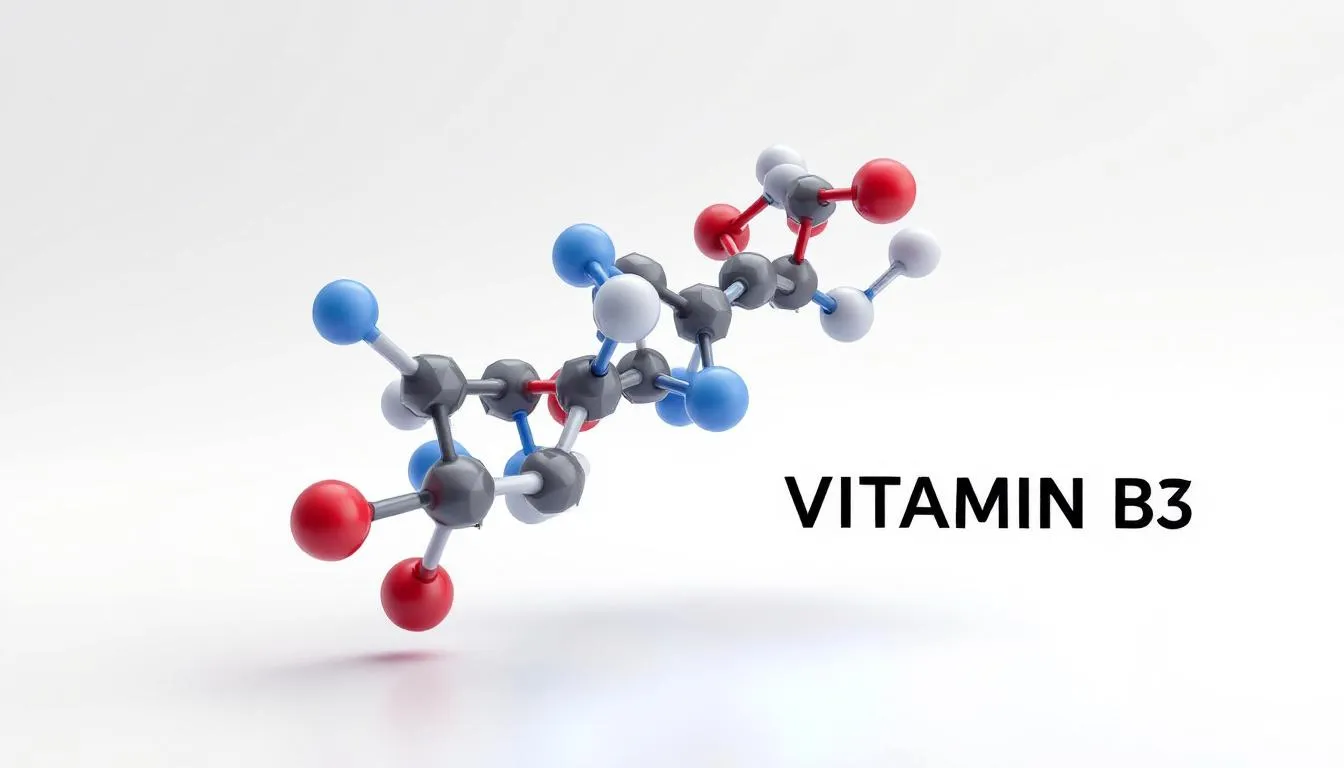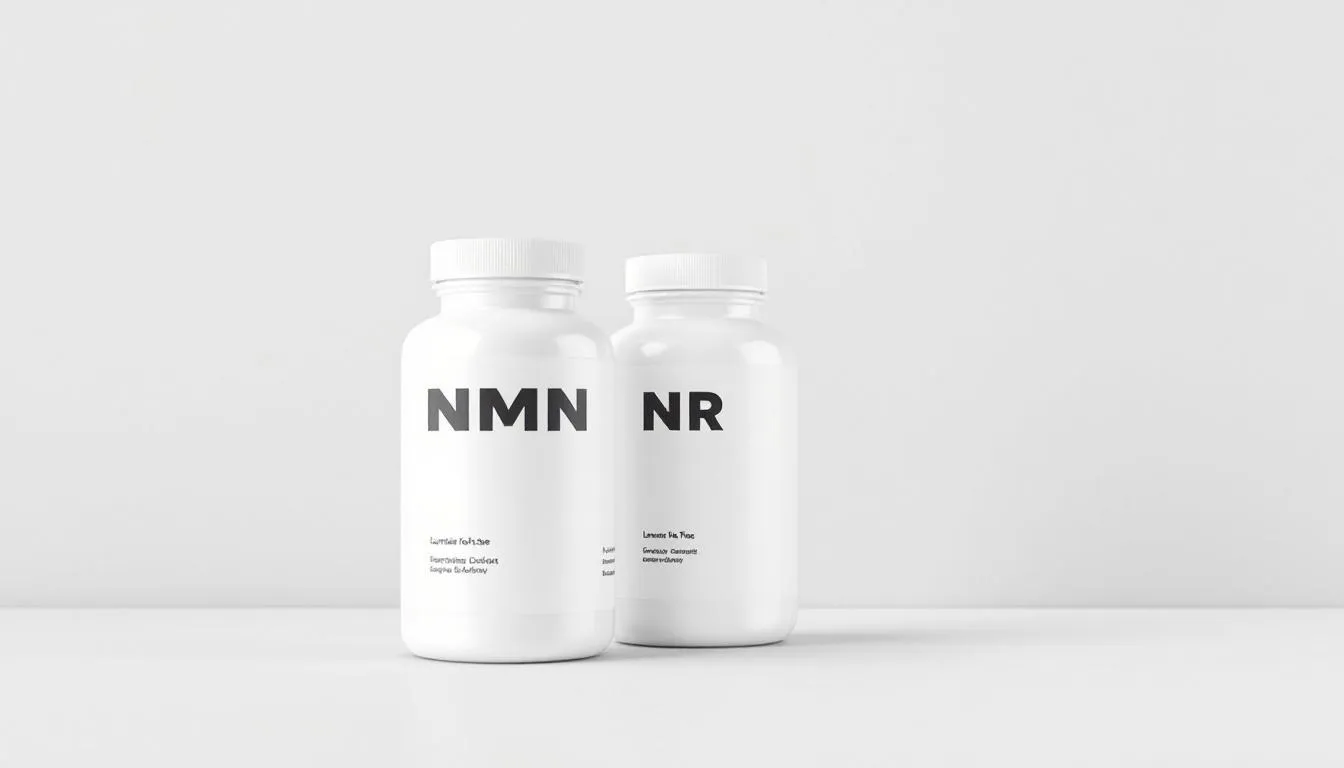The Ultimate Guide to NMN and Vitamin B3: Benefits, Differences and Uses

NMN and Vitamin B3 play crucial roles in our health by supporting energy metabolism and cellular function. But what differentiates these two? This guide explores their benefits, differences, and practical uses, helping you make informed choices for your health.
Key Takeaways
-
NMN (nicotinamide mononucleotide) is a bioactive nucleotide distinct from Vitamin B3, playing a critical role in increasing NAD+ levels, essential for energy metabolism and cellular functions.
-
Vitamin B3, particularly in forms like niacin and nicotinamide, supports cardiovascular health, lipid profiles, skin well-being, and energy production.
-
NMN supplements may provide advanced health benefits, including enhanced insulin sensitivity, improved cognitive function, and potential anti-aging effects, while also requiring careful dosage management to mitigate side effects.
Understanding NMN and Vitamin B3
Vitamin B3, also known as niacin, is a water-soluble vitamin crucial for energy production and cellular function. It exists in several forms, including:
-
Nicotinic acid (niacin): vital for cell development
-
Nicotinamide (niacinamide): serves as an antioxidant, neutralising harmful free radicals
-
Nicotinamide riboside (NR)
Each different forms plays distinct roles in the body.
NMN, or nicotinamide mononucleotide, is a bioactive nucleotide. It is derived from ribose and nicotinamide. While it is not classified as a form of Vitamin B3, NMN is closely related due to its role in the production of NAD+ (nicotinamide adenine dinucleotide). NAD+ is an essential coenzyme in various cellular processes, including energy metabolism and DNA repair.
Both NMN and Vitamin B3 are essential for converting food into energy and supporting various cellular processes. While NMN is a more advanced form and directly influences NAD+ levels, Vitamin B3, especially in its form as nicotinamide riboside, also supports cellular function and metabolic health.
How NMN and Vitamin B3 Work
NAD+ is crucial for energy production and plays a significant role in DNA repair and most metabolic redox reactions. NMN is converted to NAD+ through the salvage pathway, utilising enzymes like nicotinamide phosphoribosyltransferase and nicotinamide mononucleotide adenylyltransferase. This rapid absorption enhances NAD+ levels, improving energy metabolism and insulin sensitivity.
Vitamin B3, including nicotinamide riboside, influences NAD+ levels and supports metabolic health. Nicotinic acid (niacin) and other forms of Vitamin B3 also contribute to the production of NAD+ and NADP (nicotinamide adenine dinucleotide phosphate), essential for metabolic function and cellular health.
Key Benefits of NMN Supplements
One of the primary benefits of NMN supplements is their ability to increase NAD+ levels, which are crucial for numerous cellular functions, including energy metabolism and DNA repair. As NAD+ levels decline with age, NMN supplementation becomes essential for maintaining health and combating age-related diseases.
NMN supplementation has shown potential benefits in:
-
Improving markers of health and longevity research in older adults
-
Influencing metabolic health and reducing age-related declines (as explored in clinical trials)
-
Enhancing cognitive function
-
Supporting cardiovascular health with an nmn supplement for healthy aging and other health benefits
Animal studies indicate that NMN may reverse anti aging effects and improve cognitive health to support healthy aging. NMN helps by:
-
Combating age-related diseases
-
Improving muscle function by increasing NAD+ levels
-
Enhancing cognitive performance
-
Potentially extending lifespan
Health Benefits of Vitamin B3

Vitamin B3, particularly in the form of nicotinic acid, can improve lipid profiles by lowering LDL cholesterol and raising HDL cholesterol to increase high density lipoprotein. Increased HDL cholesterol levels help remove LDL cholesterol from the bloodstream, reducing the risk of cardiovascular diseases. Niacin is also known to lower triglyceride levels, which are linked to heart disease and cholesterol management.
Nicotinamide, another form of Vitamin B3, has anti inflammatory properties that are advantageous for skin health. It can manage acne, eczema, and maintain skin barrier health, promoting overall skin well-being.
Beyond cardiovascular and skin health, Vitamin B3 plays a vital role in energy production and metabolic health. It supports various cellular processes, contributing to overall health and well-being.
Comparing NMN and Vitamin B3
NMN has several advantages over Vitamin B3:
-
It is absorbed more efficiently and converted to NAD+ faster.
-
It has higher bioavailability.
-
It shows promise in enhancing insulin sensitivity, glucose metabolism, and physical performance.
-
It is linked to improved cognitive function and neuroprotective effects. These qualities make NMN appealing for those seeking advanced health benefits.
Both NMN and Vitamin B3 support energy metabolism and cellular repair. However, NMN is a nucleotide, while Vitamin B3 is a simpler compound, making NMN a more advanced form. Choosing between NMN and Vitamin B3 should be guided by specific health goals and consultation with a healthcare provider.
NMN vs. Nicotinamide Riboside: Which is Better?

NMN supports cellular health more efficiently than nicotinamide riboside (NR). It converts directly to NAD+, which helps in boosting NAD+ levels effectively. NR, while beneficial, has moderate bioavailability and must convert to NMN before enhancing NAD+ levels.
NR has been studied for benefits such as neuroprotection, cardiovascular health, and metabolic regulation. However, NMN shows promise in clinical studies for improving physical endurance and metabolic health. The suitability of NMN and NR supplementation for different age groups depends on individual health goals and needs.
Both NMN and NR offer unique benefits, but NMN’s direct precursor conversion to NAD+ and higher bioavailability make it a preferred choice for many, especially when considering NAD+ precursors.
Potential Side Effects and Precautions
Common mild side effects of NMN supplementation include nausea, stomach discomfort, and fatigue. Higher doses may lead to gastrointestinal issues and elevated anxiety levels in some individuals. Similar to niacin, NMN can cause skin flushing or rashes in some users.
Starting NMN supplementation at a lower dose and gradually increasing it helps monitor individual response. Taking NMN can interact with medications that affect blood sugar levels, potentially influencing insulin sensitivity, which may lead to an increased risk of complications.
Recommendations for NMN supplementation:
-
Discontinue NMN supplementation and consult a healthcare provider if side effects are severe or persistent.
-
Start with lower doses.
-
Seek medical supervision to help mitigate adverse effects and ensure the safe use of NMN supplements.
Recommended Dosages and Sources
Niacin intake recommendations are as follows:
-
Adult men require 16 milligrams per day.
-
Adult women need 14 milligrams per day.
-
Pregnant women should aim for 18 milligrams per day.
-
Lactating women should aim for 17 milligrams per day.
The upper limit for adult niacin intake is set at 35 milligrams per day.
Vitamin B3 can be sourced from foods like meat, fish, and grains. Common foods rich in niacin include:
-
Red meat
-
Poultry
-
Fish
-
Nuts
-
Fortified cereals Incorporating raw foods rich in B vitamins, like avocados and fish, can support NAD+ levels.
Ongoing research aims to clarify the optimal dosage and long-term effects of NMN supplementation. It’s important to consult with healthcare providers to determine the right supplement and dosage for individual health goals.
Emerging Research on NMN and Vitamin B3
Preliminary human studies on NMN have shown promise in improving metabolic function and physical performance in athletes. NMN may help slow down Alzheimer’s and Parkinson’s by boosting NAD+ levels, counteracting age-related declines in cellular function.
Research indicates that Nicotinamide Riboside (NR) generally has higher regulatory acceptance and more clinical trial studies supporting its efficacy compared to NMN. Further research suggests that more is required to fully understand the extent of NMN’s benefits.
Practical Tips for Supplementation
When choosing NMN supplements, consider the following:
-
Aim for NMN supplements that guarantee at least 99% purity to avoid unwanted fillers.
-
Choose NMN brands known for their reliability and transparency, often validated through customer reviews.
-
Look for third-party testing to confirm the accuracy of NMN product labeling regarding purity and potency.
Consider starting with a lower dosage of NMN, such as 250 mg, then adjust based on individual health goals. NMN supplements come in various formats—powder, liquid, or capsules—each offering different convenience and absorption rates.
Other Ways to Boost NAD+ Levels
NAD+ levels are essential for energy production and cellular health, and there are various alternative methods to boost these levels besides NMN supplements. Limiting exposure to sunlight can help maintain NAD+ levels by reducing the body’s need to repair UV-induced damage.
Dietary supplements are available that may boost NAD+ levels, providing more options beyond NMN. Both lifestyle changes and a dietary supplement can effectively enhance NAD+ levels in the body.
Summary
Summarising the key points, NMN and Vitamin B3 play significant roles in cellular health and energy production. NMN’s direct conversion to NAD+ and higher bioavailability make it a potent supplement for enhancing health and longevity. Vitamin B3, with its various forms, supports cardiovascular health, skin health, and overall well-being.
Incorporating these supplements into your health regimen requires careful consideration of dosages, potential side effects, and consultation with healthcare providers. Embracing a holistic approach to boosting NAD+ levels through lifestyle changes and dietary adjustments can further enhance your journey towards healthy aging and improved well-being.
Frequently Asked Questions
What is the difference between NMN and Vitamin B3?
The primary difference between NMN and Vitamin B3 is that NMN is a specific nucleotide that directly boosts NAD+ levels, whereas Vitamin B3 encompasses various forms such as niacin and nicotinamide, which aid in the production of NAD+.
What are the benefits of NMN supplements?
NMN supplements significantly enhance NAD+ levels, which can lead to improved cognitive and cardiovascular health, better physical performance, and a reduction in age-related diseases. These benefits highlight the potential of NMN in promoting overall health and longevity.
Are there any side effects of NMN supplementation?
NMN supplementation may lead to side effects such as nausea, stomach discomfort, and fatigue, with higher doses potentially causing gastrointestinal issues and increased anxiety levels. It is advisable to monitor your body's response when considering this supplement.
How much Vitamin B3 should I take daily?
The daily recommended intake of Vitamin B3 is 16 milligrams for adult men and 14 milligrams for adult women, with pregnant women requiring 18 milligrams and lactating women needing 17 milligrams.
How can I boost NAD levels besides taking NMN supplements?
You can boost NAD levels by limiting sun exposure, making dietary changes, and incorporating other dietary supplements. These lifestyle adjustments can contribute significantly to enhancing your NAD levels.
Researched and reviewed by Dr Elena Seranova, Ph.D.
Dr Seranova holds a master's degree in Translational Neuroscience from the University of Sheffield, UK, and a Ph.D in Stem Cell Biology and Autophagy from the University of Birmingham, UK. She is a published author in multiple peer-reviewed journals, including Cell Reports and Developmental Cell.
LEARN MORE!






Leave a comment